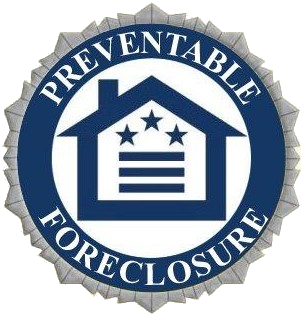Home Owner Options
 Avoid Foreclosure... Know Your Options!
Avoid Foreclosure... Know Your Options!
Whether you have fallen behind on your mortgage or just see trouble coming with a payment you can't afford, does not mean you need to sell your home. There are options worth exploring with your lender that might make it possible for you to keep your home. Your lender does not want you to lose your home, and your lender does not want to foreclose on the property. Your lender would prefer to work with you on your options that would allow you to keep your home. Here are some of your options.
Loan Modification
Loan Modification is any change to the principal, amortization schedule or interest rate of the note. If you are able to currently make your regular mortgage payments, but are having a difficult time catching up from the amount that is past-due, you can negotiate with your lender to transfer any past-due amounts into the unpaid principal balance. This would include interest and escrow, and the new amount will be re-amortized over a period of time. If you cannot afford the payments on the note at the value from two years ago, but could do so at today's value, lenders and investors have been known to reduce principal to today's value, and drop interest rates for several years, and forgive unpaid amounts altogether. If you are unable to make payments at your current rate, negotiations may be made with your lender to extend your loan balance for a longer period of time, which will make the loan amount at a more affordable level. You just can't give up- don't quit asking until they tell you there is no way you can keep from either selling or losing your home. Every situation is different, every loan is different, every servicing company is different and every "investor" who now owns your note, is different. Policies change regularly. Keep trying, don't give up, even after you have decided to contact a Mortgage Resolution Specialist and after the consultation a decision is made to do a short sale, it can be a good idea to stay in touch with your Bank. Recently we have seen banks come back to homeowners at the 11th hour and decide it would be better to have them stay... They are changing rules all the time.
.jpg) Short Sale
Short Sale
There are a large number of homeowners who have been led to think that the perfect way to avoid foreclosure and walk free from their home loan without owing a dime is simply by using a real estate short sale. Much of this type of thinking is gaining traction simply because of a lot of confusion that has occurred when it comes to strategies used in real estate. This may be true in part; however the real estate short sales process is not as simple as some people may think.
Short sales are an option some homeowners use when the bank, credit union or other types of lenders they have borrowed from provides them with the option of selling their home to a third party (generally the lender) at a price that is much lower than what they actually still owe on the note of their home loan. The short sales process is one that is often used by homeowners who are trying to avoid getting caught up in a foreclosure. Thus, receiving approval from the lender to short sale allows them the opportunity to sell their property at a significantly lower rate. It is also important to compare short sales and foreclosures to ensure you are making the right decision. To most people, it sounds rather strange for any type of lender to be willing to accept a lower amount from homeowners than what they truly owe on their home. There is more than just one reason why a bank chooses to accept short sales. The key reason is, simply put, that a short sale costs them much less than what a home foreclosure would. The expense banks already have to consider from foreclosures is astronomical. They will also be able to supply you with information in regards to benefits received from short sales. However, when they provide homeowners with the option of a short sale, they are then able to recover at least a partial amount of what they would otherwise completely end up losing. When a bank has several home loans that are non-performing, the Federal Reserve will often lower the amounts or even suspend funds they provide to these lenders.
 Deed in Lieu of Foreclosure
Deed in Lieu of Foreclosure
A Deed in lieu of foreclosure is a deed instrument in which a mortgagor (i.e. the borrower) conveys all interest in a real property to the mortgagee (i.e. the lender) to satisfy a loan that is in default and avoid foreclosure proceedings. The deed in lieu of foreclosure offers several advantages to both the borrower and the lender. The principal advantage to the borrower is that it immediately releases him/her from most or all of the personal indebtedness associated with the defaulted loan.
The borrower also avoids the public notoriety of a foreclosure proceeding and may receive more generous terms than he/she would in a formal foreclosure. Another benefit to the borrower is that it hurts his/her credit less than a foreclosure does. Advantages to a lender include a reduction in the time and cost of a repossession, lower risk of borrower revenge (metal theft and vandalism of the property before sheriff eviction), and additional advantages if the borrower subsequently files for bankruptcy. If there are any junior liens a deed in lieu is a less attractive option for the lender. The lender will likely not want to assume the liability of the junior liens from the property owner, and accordingly, the lender will prefer to foreclose in order to clean the title. In order to be considered a deed in lieu of foreclosure, the indebtedness must be secured by the real estate being transferred. Both sides must enter into the transaction voluntarily and in good faith. The settlement agreement must have total consideration that is at least equal to the fair market value of the property being conveyed. Sometimes, the lender will not proceed with a deed in lieu of foreclosure if the outstanding indebtedness of the borrower exceeds the current fair value of the property. Other times, lenders will agree since they will end up with the property anyway and the foreclosure process is costly to the lender. Because of the requirement that the instrument be voluntary, lenders will often not act upon a deed in lieu of foreclosure unless they receive a written offer of such a conveyance from the borrower that specifically states that the offer to enter into negotiations is being made voluntarily. This will enact the parol evidence rule and protect the lender from a possible subsequent claim that the lender acted in bad faith or pressured the borrower into the settlement. Both sides may then proceed with settlement negotiations. Neither the borrower nor the lender is obliged to proceed with the deed in lieu of foreclosure until a final agreement is reached.
Forbearance
In the context of a mortgage process, forbearance is a special agreement between the lender and the borrower to delay a foreclosure. The literal meaning of forbearance is “holding back.” Loan borrowers sometimes have problems making payments. This may cause the lender to start the foreclosure process. To avoid foreclosure, the lender and the borrower can make an agreement called "forbearance". According to this agreement, the lender delays his right to exercise foreclosure if the borrower can catch up to his payment schedule in a certain time. This period and the payment plan depend on the details of the agreement that are accepted by both parties. Forbearance is usually for temporary financial problems. If the borrower has more serious problems, for example if it is a variable-rate mortgage and the interest rate becomes unaffordable for the borrower, then forbearance is usually not a solution. When a lender offers a forbearance, please note they are taking the control of the situation so they can maneuver which ever way best serves the lender. The borrower is still responsible for the total monthly payment due each month, though they will accept the agreed forbearance amount. When the forbearance period is over the total amount of the original payments for that period is still due.
 Bankruptcy
Bankruptcy
Bankruptcy is a legal status of a person or other entity that cannot repay the debts it owes to creditors. In most jurisdictions, bankruptcy is imposed by a court order, often initiated by the debtor.The principal focus of modern insolvency legislation and business debt restructuring practices no longer rests on the elimination of insolvent entities but on the remodeling of the financial and organizational structure of debtors experiencing financial distress so as to permit the rehabilitation and continuation of their business.
For private households, it is argued to be insufficient to merely dismiss debts after a certain period. It is important to assess the underlying problems and to minimize the risk of financial distress to re-occur. It has been stressed that debt advice, a supervised rehabilitation period, financial education and social help to find sources of income and to manage household expenditures better need to be equally provided during this period of rehabilitation.
Foreclosure
This final option should be avoided no matter what. Foreclosure is a specific legal process in which a lender attempts to recover the balance of a loan from a borrower who has stopped making payments to the lender by forcing the sale of the asset used as the collateral for the loan. Formally, a mortgage lender (mortgagee), or other lien holder, obtains a termination of a mortgage borrower (mortgagor)'s equitable right of, either by court order or by operation of law (after following a specific statutory procedure). The foreclosure process as applied to residential mortgage loans is a bank or other secured creditor selling or repossessing a parcel of real property (immovable property) after the owner has failed to comply with an agreement between the lender and borrower called a "mortgage" or "deed of trust." Commonly, the violation of the mortgage is a default in payment of a promissory note, secured by a lien on the property. When the process is complete, the lender can sell the property and keep the proceeds to pay off its mortgage and any legal costs, and it is typically said that "the lender has foreclosed its mortgage or lien."
.jpg) Call Today
Call Today & Let Us Help! 916-786-SOLD (7653)

